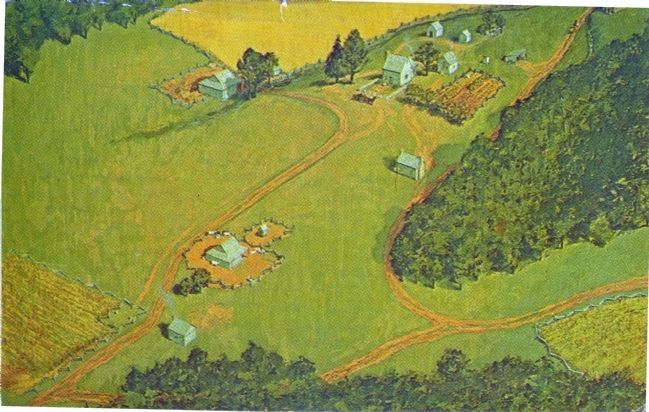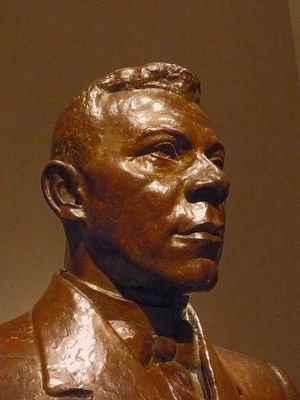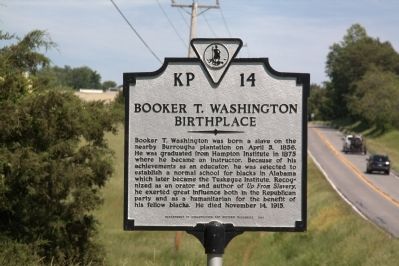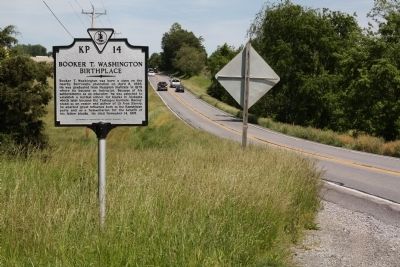Near Hardy in Franklin County, Virginia — The American South (Mid-Atlantic)
Booker T. Washington Birthplace
Erected 1987 by Department of Conservation and Historic Resources. (Marker Number KP-14.)
Topics and series. This historical marker is listed in these topic lists: African Americans • Agriculture • Arts, Letters, Music • Education • Settlements & Settlers. In addition, it is included in the Historically Black Colleges and Universities, and the Virginia Department of Historic Resources (DHR) series lists. A significant historical month for this entry is April 1757.
Location. 37° 7.287′ N, 79° 43.897′ W. Marker is near Hardy, Virginia, in Franklin County. Marker is on Booker T. Washington Highway (Virginia Route 122) east of Lost Mountain Road (County Route 636), on the right when traveling west. It is near the entrance to Burroughs Plantation. Touch for map. Marker is in this post office area: Hardy VA 24101, United States of America. Touch for directions.
Other nearby markers. At least 8 other markers are within 4 miles of this marker, measured as the crow flies. Booker T. Washington's Birthplace (about 600 feet away, measured in a direct line); Booker T. Washington National Monument (about 700 feet away); How Tobacco Farms Used Slavery (about 700 feet away); Freed Here, At Last (about 700 feet away); Slavery on the Plantation (about 800 feet away); Jack-O-Lantern Branch Trail (approx. 0.4 miles away); I think that I owe a great deal of my present strength and ability to work to my love of... (approx. 0.8 miles away); Taylor’s Store (approx. 3.4 miles away). Touch for a list and map of all markers in Hardy.
More about this marker. This marker replaced an older marker with the same name and number that read “Nearby was born Booker Taliaferro Washington, probably in 1858, the son of a slave woman. He graduated at Hampton Institute, 1875, and became instructor there. In 1881, he was appointed principal of the later famous Tuskegee Institute, Alabama. Recognized as an orator and the leader of the Negroes of America, he used his influence to promote harmony between the races and to advance the colored people educationally and economically. He died November 14, 1915.”
Regarding Booker T. Washington Birthplace. The Booker T. Washington National Memorial is in the Burroughs Plantation across the road from the marker, which is open to the public.
Also see . . . A long Journey from Slave to Educator. 2013 article by Brent Wells in the Richmond Times-Dispatch. “I have learned that success is to be measured not so much by the position that one has reached in life as by the obstacles which he has overcome while trying to succeed,” Washington wrote in his autobiography, “Up from Slavery.” “I have begun everything with the idea that I could succeed, and I never had much patience with the multitudes of people who are always ready to explain why one cannot succeed.” (Submitted on May 29, 2013.)

J.J. Prats Postcard Collection
3. Borroughs Plantation
This unused undated postcard published by “Walter H. Miller & Co, Inc., Williamsburg, Virginia” numbered 110112 has his caption: “Burroughs Plantation, exhibit at Booker T. Washington National Monument, 16 miles northeast of Rocky Mount, Va. on State Route 122. From his birth until the end of he Civil War, Booker T. Washington lived here in slavery.”

Photographed By Allen C. Browne, August 9, 2015
4. Booker T. Washington
This 1973 bust of Booker T. Washington by Richmond Barthé sits in the National Portrait Gallery in Washington DC.
“In the face of racial hatred, segregation, and disenfranchisement following the Civil War, it was unrealistic, Booker T. Washington contended, to expect African Americans to gain entry into America's white-collar professions. Instead, he suggested they establish themselves as a skilled and indispensable laboring class. With that accomplished, racial discrimination would gradually disappear. In 1881 Washington put this theory to the test, becoming the director of the newly created Negro Normal School in Tuskegee, Alabama. As the school grew, Washington became viewed as the nation's leading spokesman for African Americans. Yet by the century's end, many critics began to challenge his ‘get along’ philosophy.’” — National Portrait Gallery
“In the face of racial hatred, segregation, and disenfranchisement following the Civil War, it was unrealistic, Booker T. Washington contended, to expect African Americans to gain entry into America's white-collar professions. Instead, he suggested they establish themselves as a skilled and indispensable laboring class. With that accomplished, racial discrimination would gradually disappear. In 1881 Washington put this theory to the test, becoming the director of the newly created Negro Normal School in Tuskegee, Alabama. As the school grew, Washington became viewed as the nation's leading spokesman for African Americans. Yet by the century's end, many critics began to challenge his ‘get along’ philosophy.’” — National Portrait Gallery
Credits. This page was last revised on December 25, 2019. It was originally submitted on May 29, 2013, by J. J. Prats of Powell, Ohio. This page has been viewed 943 times since then and 36 times this year. Photos: 1, 2. submitted on May 29, 2013, by J. J. Prats of Powell, Ohio. 3. submitted on October 1, 2014, by J. J. Prats of Powell, Ohio. 4. submitted on October 17, 2015, by Allen C. Browne of Silver Spring, Maryland.
Editor’s want-list for this marker. Photos of the plantation and monument • Can you help?

